The war on differences may be won by speaking up, as one | Opinion
We are living in turbulent, but not unfamiliar, times. We clearly are experiencing culture wars predicated on differences. I say that these times are not unfamiliar because history tells us that this is a mistake we have made before.
We’ve come to the end of Pride Month, when we recognized and celebrated the LGBTQIA+ community. We also were reminded of how much progress the members of this community have made, despite facing discrimination because their lives and loves were viewed as unconventional, different.
I believe America is the greatest country in the history of the world. We introduced ourselves by unapologetically declaring, “We hold these truths to be self-evident, that all men are created equal, that they are endowed by their Creator with certain unalienable Rights, that among these are Life, Liberty and the pursuit of Happiness.”
It would later reaffirm its commitment to the rights and values of individuals, on its “birth certificate,” the U.S. Constitution. This is the enduring conviction that constitutes who we are as a country.
In the nearly 247 years since our birth, we have steadily matured in our efforts to perfect our union. History tells us that what is needed for the continued perfection of our union is an actual union. A persistent belief and commitment to the transcendent rights of all. We have to stand for each other.
These are the times that we should all hear echoes of Martin Niemöller’s poignant statement that begins, “First they came for . . .” and note its reverberations repeatedly throughout history. It reminds us of the dire consequences of remaining silent when injustice befalls others.
Niemöller’s experience as a Nazi sympathizer who only spoke out when it affected him personally is a cautionary tale, urging us to do better by not just standing behind each other, but by speaking up, loudly, for one another. We cannot afford to have a deaf ear to discrimination or turn a blind eye to bigotry.
It is easy to distance ourselves from issues that do not directly concern us, but, in truth, these issues affect us all, regardless of our individual backgrounds. America’s strength depends on our collective care for one another.
We still face racism, antisemitism, homophobia, transphobia and other forms of hatred and discrimination. We must reject complacency and passivity, instead speaking up even when it seems like we are not directly affected. Because, in reality, we are. The erasure of one community’s history or the marginalization of one group’s rights weakens the entire nation.
Let us imagine a revised version of Niemöller’s words that reflects the challenges we face today. “They came for professors, but I wasn’t a professor, so I said nothing. They came for Black history, but that wasn’t my history, so I said nothing. They came for members of the LGBTQIA+ community, but I wasn’t a member, so I said nothing. They came for unions, but I wasn’t affiliated, so I said nothing. And then, they came for me, and there was no one left to say anything.”
Our interconnectedness necessitates that we raise our voices against injustice and discrimination every time, without hesitation. To truly build a more-inclusive and compassionate society, we must recognize the humanity in one another. We must extend our desires for a better future not just to ourselves, our immediate circles and our “kind” but to all individuals and communities.
The United States of America was founded on the principles of unity and shared values. To preserve and strengthen that unity, we must actively care for one another, especially when it seems inconvenient or unrelated to our personal interests. Our collective voice, our shared action and our unwavering commitment to justice can guide our nation toward a brighter future.
Oliver G. Gilbert III is chairman of the Miami-Dade County Commission and represents District 1.


